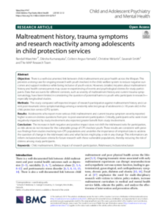Displaying 131 - 140 of 507
This open access study compared self-reported impact of research participation against maltreatment history and current post-traumatic stress symptomatology among a randomly selected group of adolescents (< 18 years old) in the child protection service (CPS) system.
This study examined the effectiveness of solution-focused brief therapy (SFBT) on child well-being and family functioning outcomes for child welfare involved parents.
This study investigates staff perspectives on a new form of intensive oversight developed in New York State to prevent maltreatment of youth in care facilities.
The present article reports findings of a narrative review of self- and carer-report mental health data that addressed the research question: Do adolescents who reside in statutory out-of-home care (OOHC) systematically underreport their mental health difficulties in population studies?
This paper reports on the initial formative phase of a pilot feasibility randomised controlled trial; SOLID (Supporting Looked After Children and Care Leavers In Decreasing Drugs, and Alcohol) that aimed to adapt two evidence-based psychosocial interventions, Motivational Enhancement Therapy and Social Behaviour and Network Therapy, which will aim to reduce substance misuse by looked after children.
This article examines the professional identities of family therapists employed by Family Counselling Services (FCS) in Norway and their experiences providing therapeutic services to parents whose children are placed in public care.
This article has a twofold purpose. First, through synthesizing existing literature this article offers context and education about adverse experiences and concerns of children in foster care. Second, through an attachment lens clinical suggestions and interventions are discussed to assist MFTs in improving many of the emotional, mental, and physical health concerns found in this population.
This study explored children orphaned by AIDS perceptions and experiences of HIV-related stigma and how it has affected their psychosocial well-being.
The aim of this study was to analyse subjectisuppleve well-being (SWB) among adolescents in care, considering the type of placement in greater depth and how it correlated with several explanatory variables.
The purpose of the study presented in this open access article was to provide an overview of the literature on associations between determinants and social climate and between social climate and outcomes in therapeutic residential youth care (TRC).

